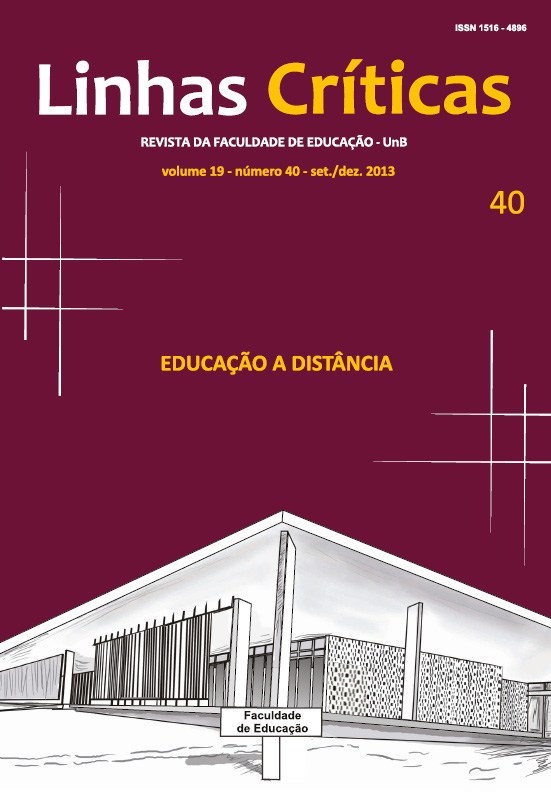Education@digital technologies: an investigation of the “Diário de Classe” case on Facebook
DOI:
https://doi.org/10.26512/lc.v19i40.4200Keywords:
Education, Technology, Digital Technology, Facebook, DialogueAbstract
This paper investigates the webpage in the Facebook social network entitled “Diário de Classe” (Class Diary), created in 2012 by a Brazilian student, in order to denounce structural and educational problems in her school. It seeks to understand the potential of the Internet as a field of expression, without denying the thin line that separates the positive element of virtual expressions from a dangerous exhibitionist process of forming fixed opinions. It is a matter of underlining the importance of criticality while making use of digital technologies, and the extent to which such telematic devices are involved in current discussions about the formation of the individual
Downloads
References
ADORNO, Theodor W. O que significa elaborar o passado. In: _______. Educação e emancipação. Tradução de Wolfgang Leo Maar. 6 ed. Rio de Janeiro: Paz e Terra, 2011a.
ADORNO, Theodor W. Educação após Auschwitz. In: _______. Educação e emancipação. Tradução de Wolfgang Leo Maar. 6 ed. Rio de Janeiro: Paz e Terra, 2011b.
BACON, Francis. Novum organum ou verdadeiras indicações acerca da interpretação da natureza. Tradução de José Aluysio Reis de Andrade. São Paulo: Abril Cultural, 1973.
BELLONI, Maria Luiza. O que é mídia-educação. 3 ed. Campinas, SP: Autores Associados, 2009.
COSTA, Belarmino César Guimarães da. Comunicação e educação na era digital: reflexões sobre estética e virtualização. Comunicação, Mídia e Consumo, São Paulo, vol. 7, n. 19, p. 87-103, jul. 2010.
DEBORD, Guy. A sociedade do espetáculo. Tradução de Estela dos Santos Abreu. Rio de Janeiro: Editora Contraponto, 1997.
FABER, Isadora. Diário de Classe. Florianópolis, SC: 2012. Disponível em <https://www.facebook.com/DiariodeClasseSC >. Acesso em: 17 jan. 2013.
FANTIN, Mônica; RIVOLTELLA, Pier Cesare. Cultura digital e formação de professores: usos da mídia, práticas culturais e desafios educativos. In: ______. (Orgs.) Cultura digital e escola: pesquisa e formação de professores. Campinas: Papirus, 2012.
KENSKI, Vani Moreira. Educação e tecnologias: o novo ritmo da informação. 8 ed. Campinas, SP: Papirus, 2011.
LION, Carina Gabriela. Mitos e realidades da tecnologia educacional. In: LITWIN, Edith (Org.). Tecnologia Educacional: política, histórias e propostas. Porto Alegre: Artes Médicas, 1997.
LYOTARD, Jean-François. Algo assim como: comunicação... sem comunicação. In: PARENTE, André (Org.). Imagem-máquina: a era das tecnologias do virtual. Tradução de Rogério Luz et alii. 2 ed. Rio de Janeiro: Editora 34, 1996.
MILL, Daniel. Das inovações tecnológicas à s inovações pedagógicas: considerações sobre o uso de tecnologias na educação a distância. In: MILL, D.; PIMENTEL, N. Educação a Distância: desafios contemporâneos. São Carlos: EdUFSCar, 2010.
OLIVEIRA, Alessandro Eleutério de. ZUIN, Antônio Álvaro Soares. Alunos e professores no Orkut: a educação escolar na arena ciberespacial. Linhas Críticas, Brasília, DF, v. 17, n. 34, p. 561-582, set.-dez. 2011.
PARISER, Eli. O filtro invisível: o que a Internet está escondendo de você. Tradução de Diego Alfaro. Rio de Janeiro: Zahar editores, 2012.
PESQUISA revela hábitos de uso de TV, computador e celular por jovens. São Paulo: 2012. Disponível em: < http://www.arede.inf.br/noticias/4526-pesquisa-geracoes-interativas >. Acesso em: 08 out. 2013.
PROFESSORES da Escola Maria Tomázia Coelho resolvem dar a sua versão ao DC. Florianópolis, SC: 2012. Disponível em: < http://diariocatarinense.clicrbs.com.br/sc/diario-da-redacao/noticia/2012/11/professores-da-escola-maria-tomazia-coelho-resolvem-dar-a-sua-versao-ao-dc-3947872.html >. Acesso em: 17 jan. 2013.
SAFERNET. 87% dos jovens afirmam que não possuem restrições para uso da Internet. São Paulo: 2008. Disponível em < http://www.safernet.org.br/site/noticias/jovens-sem-limites-internet-revela-pesquisa-in%C3%A9dita-safernet >. Acesso em; 11 out. 2012.
SANTOS, Laymert Garcia dos. A televisão e a Guerra do Golfo. In: PARENTE, André (Org.). Imagem-máquina: a era das tecnologias do virtual. Tradução de Rogério Luz et alii. 2 ed. Rio de Janeiro: Editora 34, 1996.
SIBILIA, Paula. O show do eu: a intimidade como espetáculo. Rio de Janeiro: Nova Fronteira, 2008.
SIBILIA, Paula. Redes ou paredes: a escola em tempos de dispersão. Tradução de Vera Ribeiro. Rio de Janeiro: Contraponto, 2012.
THOMPSON, John. A mídia e a modernidade: uma teoria social da mídia. Tradução de Wagner de Oliveira Brandão. 7 ed. Petrópolis, RJ: Vozes, 2005.
TÜRCKE, Christoph. Sociedade excitada: filosofia da sensação. Tradução de Antônio Álvaro Soares Zuin, Fabio Durão, Francisco Fontanella e Mario Frungillo. Campinas, SP: Editora da Unicamp, 2010.
Downloads
Published
How to Cite
Issue
Section
License
Copyright (c) 2016 Linhas Críticas

This work is licensed under a Creative Commons Attribution 4.0 International License.
Authors who publish in this journal agree to the following terms:
-Authors maintains the copyright and grants the journal the right of first publication, the work being simultaneously licensed under the Creative Commons Attribution License which allows the sharing of the work with recognition of the authorship of the work and initial publication in this journal.
- Authors are authorized to enter into additional contracts separately, for non-exclusive distribution of the version of the work published in this journal (eg publish in institutional repository or as a book chapter), with acknowledgment of authorship and initial publication in this journal.
-Authorers are allowed and encouraged to publish and distribute their work online (eg in institutional repositories or on their personal page) at any point before or during the editorial process, as this can generate productive changes as well as increase the impact and the citation of published work (See The Effect of Free Access).



